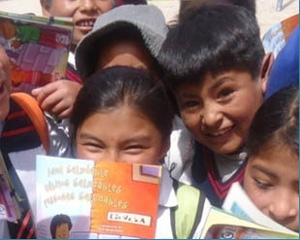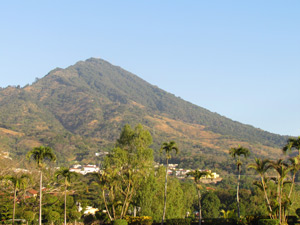The development of water, sanitation and hygiene educational materials for Latin American countries began in 2010 in partnership with UN Habitat. Through UN Habitat connections, Project WET worked with local communities and organizations to determine priority topics for the educator guides through Writing and Material Development Workshops. Based on suggestions from the workshops, Project WET then customized materials for each project country based on local culture and context. These materials were field tested by select schools in each country to ensure the materials were appropriate contextually and culturally for the specific project regions. Once the final materials were published, Project WET conducted Training of Trainer Workshops in each region with local educators/trainers to teach the instructional methods in the customized guides. The trainers from the workshops then worked with local partners to train other educators on the methods they learned during the workshop and to distribute the materials to their communities.


Project WET and UN Habitat partnered with Plan International in two cities in Bolivia to bring a comprehensive water, sanitation and hygiene project to the country. Plan International installed new water and sanitation facilities in schools in Patacamaya and in San Ignacio de Velasco in partnerships with the municipalities and UN Habitat. Coupled with Project WET’s educational materials, the school programs will reach thousands of children with clean water, clean sanitation facilities and the education to create lasting healthy habits.
Due to the extreme differences in the culture and climates of the two regions, Project WET customized materials for each project area. UN Habitat, Plan International and Project WET distributed 500 Educators Guides and 10,000 Student Booklets customized for the Altiplano in Patacamaya and 500 Educators Guides and 10,000 Student Booklets customized for the tropics in San Ignacio de Velasco.

Patacamaya lies in the Altiplano of Bolivia, approximately two hours outside of La Paz. It is a city of approximately 12,000 people who are primarily indigenous Aymara. Plan and UN Habitat installed new water and sanitation facilities in Patacamaya schools, while Project WET provided interactive educational materials about water for teachers in these schools. Teachers in Patacamaya received training on the instructional methods through Project WET and their partners. Working closely with a local educational consultant, Plan International, UN Habitat and the Ministry of Education, the educational trainings reached 272 teachers and 5062 students in Patacamaya in 2011 and 2012.

San Ignacio de Velasco is a city in the jungle of eastern Bolivia on the border of Brazil. The city is well known for its large, ornate Jesuit church and the rich culture of the Chiquito people. Project WET partnered with UN Habitat and Plan International to bring educational materials on water, sanitation and hygiene to schools receiving new water and sanitation facilities from the two organizations. The educational trainings reached 151 educators and 2950 students in San Ignacio de Velasco in 2011 and 2012.

Project WET worked with educators in the cities of Quibdó and Tumaco in the Pacific Region of western Colombia. Both cities have populations that are predominantly of Afro-American descent, with a larger number of children and families displaced by violence in the country. The areas have extreme problems of sanitation and hygiene related to water, and as a result, waterborne diseases are a serious health threat

Quibdó lies on the Atrato River in Western Colombia. The Atrato River is an important waterway that passes through miles of jungle on its way to the Caribbean Sea. Quibdó is also one of the wettest places in the world, receiving more than 1000 centimeters of rain each year. Without any sanitation system in a large part of the city, water sources are often contaminated, and waterborne diseases cause serious health problems. Luckily, many people can rely on rain water for drinking water, but education on the proper storage and management of this water is still a necessity. Working with the government of Quibdó, UN Habitat and UNICEF, Project WET distributed 500 educator Guides and 10,000 student booklets to educators in the municipality.
Tumaco is a coastal city in Southern Colombia that receives a significant amount of rainfall each year. Many of the city’s 180,000 residents lack sanitation services, meaning that the water around Tumaco has become highly polluted. Project WET worked closely with Action Against Hunger (ACF) to deliver trainings and distribute 500 Educators Guides and 10,000 student booklets to teachers and educators in the municipality.

Located in the department of La Libertad, southwest of San Salvador, Santa Tecla is home to both charming streets and shantytowns. Project WET worked with the government of La Libertad, the local Ministry of Education and UN Habitat to conduct teach trainings and distribute materials teachers and students throughout Santa Tecla.
The municipality of Apopa is part of the department of San Salvador, and Project WET, in partnership with UN Habitat, worked closely with the San Salvador Ministry of Education and mayor’s office to conduct teacher trainings and bring Educator Guides and Student Activity Booklets to Apopa. Despite being part of the capital city’s department, Apopa schools only receive water at certain times during the day and often only on certain days. Furthermore, sanitation is lacking or primitive in many schools. Project WET’s educational materials on water, sanitation and hygiene will promote healthy behaviors among students to mitigate some of the water and health challenges Apopa residents face.

Project WET worked closely with UN Habitat, the Joint Programme of Millennium Development Goals (MDG-F) and the Secretary of Education for the State of Veracruz to bring customized educational materials to schools in the State of Veracruz. The State of Veracruz is located in eastern Mexico on the Gulf of Mexico. It has more than 7.5 million inhabitants. The state is diverse, with port cities, picturesque colonial cities, mountains and jungles. It is generally wet. Project WET focused on the urban centers of Xalapa and Zongologica and its surrounding towns for training and piloting the water, sanitation and hygiene project. Given Veracruz’s unique heritage, Project WET used a local artist to illustrate Veracruz’s guides and worked closely with partners to ensure the materials were contextually appropriate. The Secretary of Education for Veracruz distributed 1,000 Educator Guides and 20,000 Student Activity booklets through trainings in the State of Veracruz.

Project WET worked closely with the UNDP in Huancayo, Peru, to implement a water, sanitation and hygiene program throughout the Region of Junín. Located in central Peru, the Region of Junín has encompasses the Altiplano, mountainous peaks and the Amazon jungle. The capital city, Huancayo, is a large city in the Altiplano. In cooperation with the UNDP, Ministry of Education and the Government of the Region, Project WET provided trainings and distributed materials to 940 educators and 19,940 students throughout the region.
Clean water, proper sanitation and good hygiene form a solid foundation for a student’s health education. This activities guide is designed to enable teachers to take an active role in making a real difference in the lives of children and their families. Its pages are filled with engaging ways to impart an understanding about how common water-borne and hygiene-related diseases are spread. In addition to learning how to protect their health and that of their families, students will gain a healthy respect for the important water sources on which we all depend.
Good habits lead to good health. And the sooner children begin in life, the better. You’ll feel great knowing that through the activities in this booklet children will gain a healthy start on taking better care of themselves and the sources of clean water that we all need to stay healthy. The illustrations are customized specifically to the local context of each project country to enhance the learning experience for children.
A summary of rainwater harvesting and its components with helpful links.